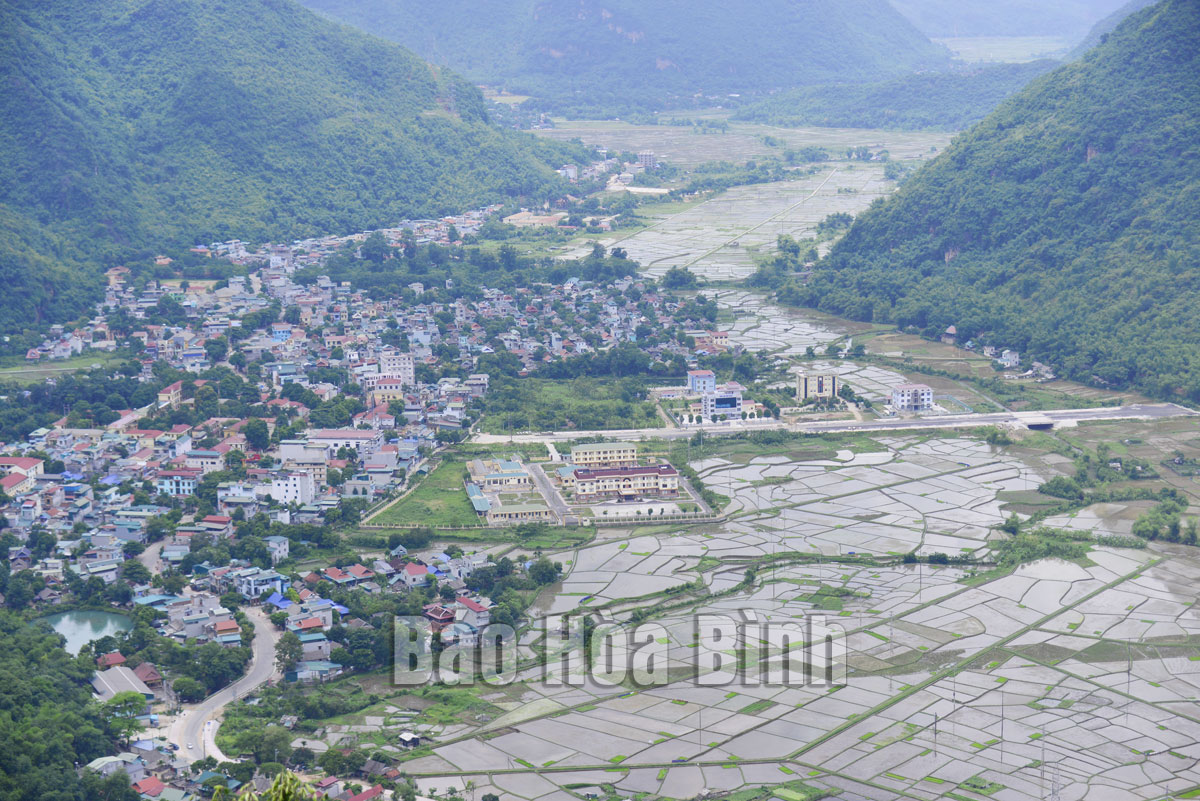
(HBO) – Developing Mai Chau into a key tourism area and an attractive, hospitable and safe travel destination of Hoa Binh province is part of the targets set at the 26th Party Congress of the district for the 2020 - 2025 tenure. Dinh Duc Lan, member of the provincial Party Committee and Secretary of the district Party Committee, has granted an interview about the issue to the Hoa Binh Newspaper.
The beauty of Mai
Chau township in Mai Chau district.
The official said the district’s Party
organisation made a detailed plan for implementing the resolutions of the 13th
National Party Congress and the 17th provincial Party Congress.
As a result, Mai Chau has managed to tap into
agricultural, tourism, and service development potential. It is currently home
to nearly 20 tourism projects, some of which have high quality such as Avana
Resort, Mai Chau Lodge, Mai Chau Ecolodge, Ba Khan Village Resort, and Mai Chau
Hideaway Resort. Many community-based tourist sites have taken shape in Chieng
Chau, Na Phon, Son Thuy, Hang Kia, and Pa Co communes.
Despite significant achievements, Mai Chau
remains a mountainous district with numerous difficulties, Lan admitted.
In the time ahead, he said, the district will
push ahead with implementing the resolutions on the Party building and the
Politburo’s Directive No. 05 on stepping up the studying and following of late
President’s ideology, moral example and style. It will also improve local Party
organisations’ leadership and combatant capacity so that the Party’s
resolutions will be carried out quickly and fruitfully.
In particular, Mai Chau will boost coordination
with relevant parties to assess potential and advantages, conduct planning, and
attract resources for infrastructure development, especially transport
facilities linking with tourist attractions. It will encourage investors to
build high-end hotels, resorts, entertainment centres, and restaurants to serve
travellers.
Besides, it will facilitate local communities’
engagement in tourism activities; propose mechanisms for supporting
disadvantaged areas, including remote areas and the communes located in the
vicinity of Hoa Binh Lake; develop agriculture in tandem with tourism products;
and effectively carry out social security policies to improve people’s material
and spiritual life.
Authorities will also instruct tourism service
providers to improve service quality; protect landscapes and the environment;
create cultural tourism products linked with local festivals, craft villages,
and communities; and build up Mai Chau as a hospitable destination with which
all visitors are satisfied when setting foot here, according to the
Secretary./.
Located just a 20-minute drive from Hoa Binh City, Ora Hill Farmstay & Glamping Hoa Binh is a captivating new destination nestled in Mo hamlet, Bình Thanh commune, Cao Phong district. Combining farming with leisure, this tranquil retreat is perfect for those seeking balance, joy, and an immersive experience in the expansive beauty of nature.
Muong Bi - Tan Lac is renowned as one of the four famous Muong regions in Hoa Binh province. Blessed by nature with a favourable climate and stunning landscapes, Tan Lac holds great advantages for tourism development. The local tourism industry has made remarkable strides in recent times thanks to the attention and support from the local authorities and sectors.
With its strategic location, well-developed transport network, and diverse soil and climatic conditions, Hoa Binh is emerging as a must-visit destination in Vietnam's northwestern tourism corridor. The province boasts numerous attractions, including the Kim Boi hot springs (Kim Boi district), the Dau Rong cave complex (Cao Phong), the Mai Chau valley (Mai Chau), and the iconic Hoa Binh hydropower plant.
The northern mountainous province of Hoa Binh has been listed among the 71 most beautiful places to visit worldwide by the prestigious US travel magazine Condé Nast Traveller.
Hoa Binh province’s rich natural and cultural resources position it as a prime location for developing community-based tourism (CBT). In recent years, support from central and provincial policies, as well as assistance from non-governmental organisations, have encouraged local ethnic minority and mountainous communities to actively engage in the sector.



